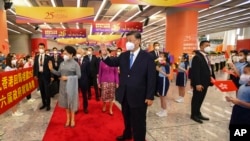Hong Kong should expect economic stability over the next 25 years, analysts say, along with increasingly tight control by China, which began to rule the international finance center 25 years ago this week.
Chinese President Xi Jinping arrived in Hong Kong Thursday to celebrate the 25th anniversary of the former British colony’s handover.
Economically, Beijing is working to link Hong Kong more closely with the Chinese mainland, especially the technology-driven, factory-intensive neighboring Guangdong province. The Hong Kong-Guangdong-Macao region has more than 86 million people and a $1.67 trillion gross domestic product.
That process could increase the wealth flowing into Hong Kong, the Council on Foreign Relations said in a May 19 analysis.
"This dramatic transformation will not be the end of Hong Kong as a global financial hub, as it has already begun to boost economic integration with mainland China," the think tank's East Asia legal expert, Jerome A. Cohen, said in the analysis.
Hong Kong lies now "at a crucial stage of advancing toward further prosperity," China's official Xinhua News Agency said Thursday after Xi arrived.
China has administered Hong Kong, a former British colony, since 1997. The U.K. managed it for about 150 years and made a declaration with China for the 1997 handover. China at that point agreed to run Hong Kong for 50 years, through 2047, under a "one country, two systems" model that would give the territory a measure of local autonomy.
Xi is making his first trip outside mainland China since before the pandemic and his first to Hong Kong since 2017. The visit is likely to be "smooth" and "successful" as a confirmation of Beijing's policies toward Hong Kong, said Yun Sun, director of the China program at the Stimson Center in Washington.
"Looking into the next 25 years, I think we're likely to see Hong Kong becoming more and more like a mainland city, like a regular city under mainland control, and operating according to the will and policy of Beijing," Sun said.
Political freedoms seen declining
Chinese leaders pushed back against Hong Kong's autonomy and other political freedoms in 2020 after months of mass anti-China protests and rioting a year earlier.
To stop future protest waves, China approved a Hong Kong-focused national security law in June 2020. Journalists and hundreds of former demonstrators have been arrested on suspicion of anti-government activity.
Hong Kong's libraries have pulled politically sensitive books, and universities are hiring top faculty members who support Beijing, said Wang Yaqiu, New York-based senior China researcher with Human Rights Watch. It is harder now to stand up for labor rights, Wang added. She said posting anti-government material online runs the risk of arrest, even though foreign social media channels are open in Hong Kong, unlike the case in mainland China.
"There's no technical obstacles like in the mainland, but when you know if you can post things but you can be punished for posting contents that are critical of the government — you can be arrested, you can go to prison for years — then of course you wouldn't do it," Wang said.
Beijing's increased leverage in Hong Kong's legislature and the security law have thrown particular doubt onto how much autonomy China will allow through 2047.
"It will be just another Chinese city, in political terms, long before 2047 and may one day be competing for its economic life against the likes of Shanghai and Shenzhen," said Sean King, vice president of the Park Strategies political consultancy in New York. "Either way, Hong Kong's days as Asia's World City, as it's been marketed to the world, are long since gone."
"Remaining freedoms" will disappear entirely over the next 25 years, said Phil Robertson, deputy director of Human Rights Watch's Asia Division.
Protests were not expected during Xi's visit to Hong Kong this week due to heightened security. But some people have draped black cloth over the Chinese flags on display for the festivities, Wang said.




